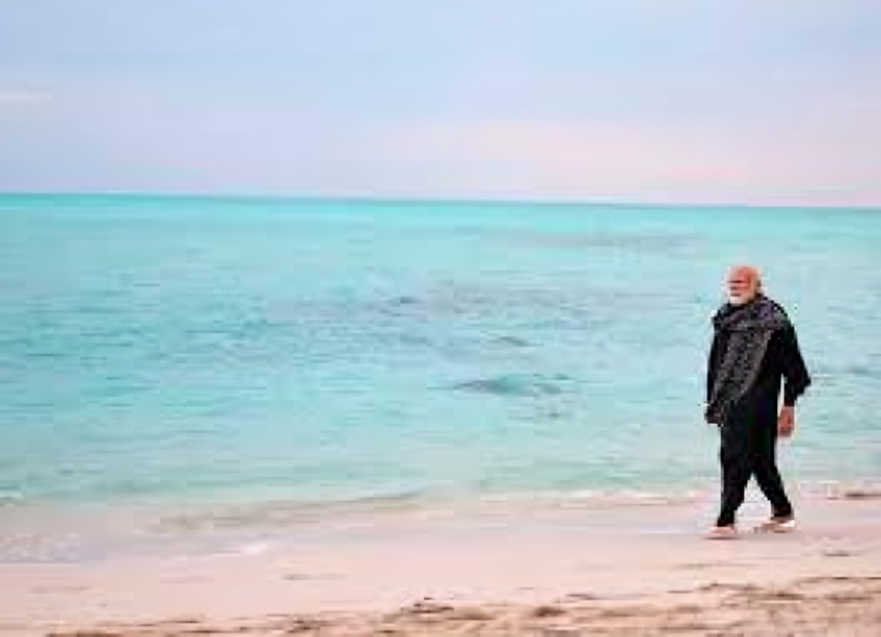
Modi’s Remote Retreat Roils the Waters in the Maldives
Exploring the Impact of Modi’s Beach Retreat on India-Maldives Relations
In a surprising turn of events, Indian Prime Minister Narendra Modi’s picturesque escapade to Lakshadweep, a lesser-known Indian archipelago, has triggered diplomatic ripples that extend beyond the turquoise waters and white-sand beaches. This article delves into the aftermath of Modi’s social media posts and the ensuing controversy, shedding light on the intricate dynamics between India and the Maldives.
Modi’s Lakshadweep Odyssey: A Tourism Push or Diplomatic Misstep?
Modi’s social media shares showcased him snorkeling, strolling on pristine beaches, and lounging in serene settings, touting the archipelago’s untapped potential for tourism. While Indians applauded the campaign, it invoked a storm in the Maldives, with senior officials resorting to derogatory language, labeling Modi a “clown,” a “terrorist,” and a “puppet of Israel.”
Nationalist Backlash: #BoycottMaldives Trends in India
The Indian response was swift and potent. Government officials, Bollywood stars, and cricketers rallied to promote Lakshadweep, urging citizens to explore local holiday destinations. The hashtag #BoycottMaldives gained momentum on social media, symbolizing canceled trips and a notable decline in bookings to the Maldives. EaseMyTrip, a prominent Indian travel portal, suspended flights to the Maldives in solidarity with the nation.

Fragility in Diplomacy: The High Stakes for the Maldives
The incident unveiled the delicate nature of India-Maldives relations, susceptible to breakdowns amid the strategic competition between Beijing and New Delhi for influence in the region. With India being the largest contributor to Maldives’ tourism market, constituting nearly 11% of visitors, and a crucial military ally, the fallout poses significant challenges for both nations.
Maldives’ Diplomatic Balancing Act: Pro-India or Pro-China?
Successive Maldivian governments have grappled with aligning with either India or China, and the recent controversy amplifies the stakes. Despite India’s strategic alliance and significant economic impact through tourism, Maldives President Mohamed Muizzu’s pro-Chinese stance has strained relations. The call to remove Indian military personnel from the islands, based on perceived threats to sovereignty, further escalated tensions.
Muizzu’s Pivot to China: Implications for India-Maldives Ties
President Muizzu’s recent visit to China signals a potential shift in the geopolitical landscape. Describing Beijing as the Maldives’ “closest” ally, Muizzu seeks increased Chinese investment, possibly challenging India’s historical dominance in the region. While some experts argue that the visit may not indicate a tilt towards China, the controversy over Indian troops stationed in the Maldives adds complexity to the diplomatic equation.

Evaluating Maldives’ Diplomatic Tightrope
Former Maldivian Foreign Minister Ahmed Shaheed emphasizes the importance of maintaining strong ties with India, given the economic and geopolitical repercussions. While Muizzu’s visit to China may not be unusual, the controversy over Indian military personnel in the Maldives has ignited tensions. The delicate diplomatic balancing act underscores the Maldives’ dependency on both India and China, with potential ramifications for its economy and international standing.
Navigating Future Diplomatic Challenges
As the Maldives seeks to manage the fallout from the Modi controversy, there are indications that the nation aims to avoid further escalation. The Maldives Association of Tour and Travel Operators urges reconciliation, emphasizing that derogatory comments do not represent the sentiments of Maldivians. Foreign Minister Moosa Zameer reinforces the commitment to positive dialogue with partners, recognizing the economic implications of a spat with India.
Conclusion: Diplomatic Resilience Amidst Geopolitical Shifts
In conclusion, the Modi-Lakshadweep controversy serves as a microcosm of the complex geopolitical dynamics between India and the Maldives. The incident highlights the intricate dance between economic interests, diplomatic ties, and regional influence. As the Maldives navigates its diplomatic tightrope, the fallout from this episode underscores the need for resilient and nuanced foreign relations.




